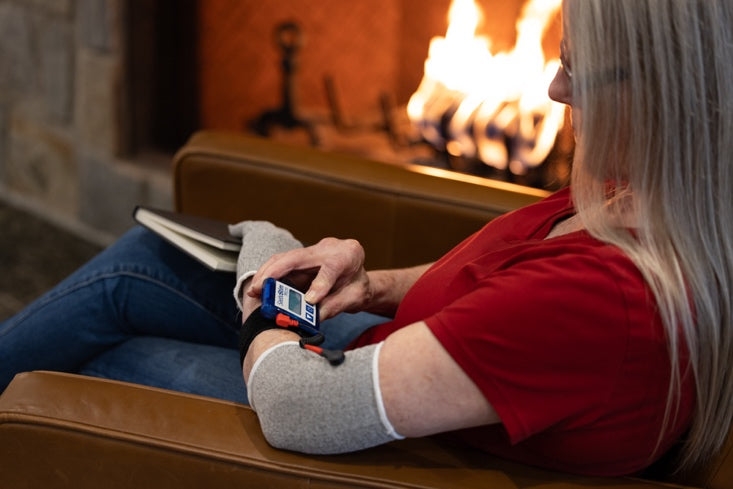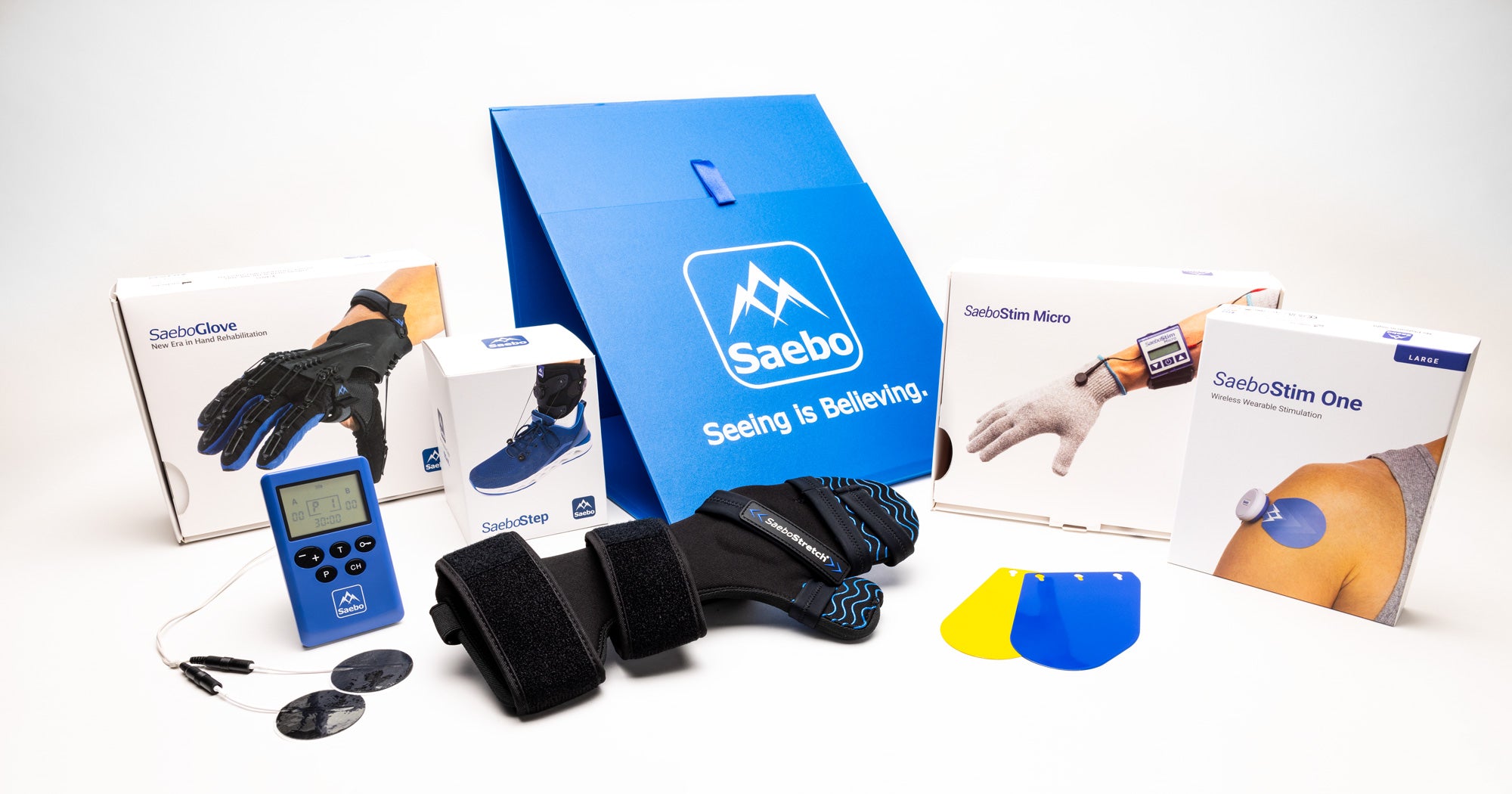Stroke Caregiver Tips from Occupational Therapists

Caregivers are the unsung heroes of stroke recovery. After a stroke, family and relationship dynamics can change dramatically. Trying to care for someone that isn’t able to do or say things like they used to can take awhile to get used to and the recovery process can sometimes be slow. Sometimes you can even care so much for your loved one, you forget to care about yourself.
Having support and advice from people that have been there can really help new or even seasoned caregivers. We interviewed some of the best occupational therapists on the internet for their top tips to help give advice for caregivers and how occupational therapist can help in the recovery process too. Here are the best caregiver tips they recommended.
Stroke Caregiver Tips from Occupational Therapists
Krista Covell-Pierson, OTR/L, BCB-PMD
covellenterprises.com

(Photo Source-Covell Care)
Covell-Pierson stresses an empowered approach to working with occupational therapists. She especially values self-advocacy
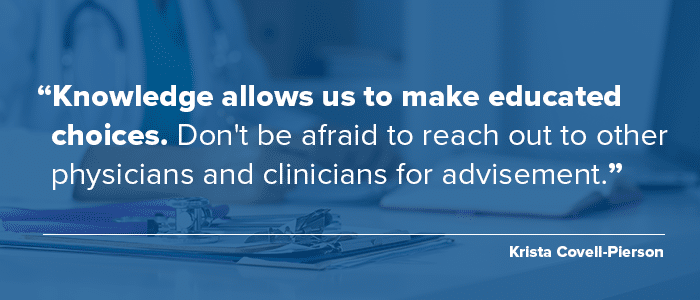
Covell-Pierson's caregiver tips-
Covell-Pierson understands that a positive mindset is critical for stroke recovery. “Take the word can’t out of your vocabulary,” she says, “There are lots of ways to do things, potential gains to be made, and the words ‘can not’ are so definitive and disheartening.” A disabling attitude can increase feelings of depression and anxiety for a loved one and reduce their desire to do therapy at all.
She also offer some great caregiver advice for researching and working with healthcare professionals. “Knowledge allows us to make educated choices. Don't be afraid to reach out to other physicians and clinicians for advisement,” she says. After all, your current health care team should support your efforts to take a proactive role in recovery.
“Work with an occupational therapist that supports what you want to do,” Covell-Pierson says. Your therapist should help your loved one get back to doing the things they enjoy like drawing, writing, or playing with children or grandchildren. Together, you can make great progress.
Mandy Chamberlain, MOTR/L

(Photo Source- Seniors Flourish)
Chamberlain stresses that you must be educated on the realities of your loved one’s physical capabilities. You should also understand that support from friends and family tends to dwindle as time goes on, but both the survivor and the caregiver should receive ongoing support at every stage of recovery.
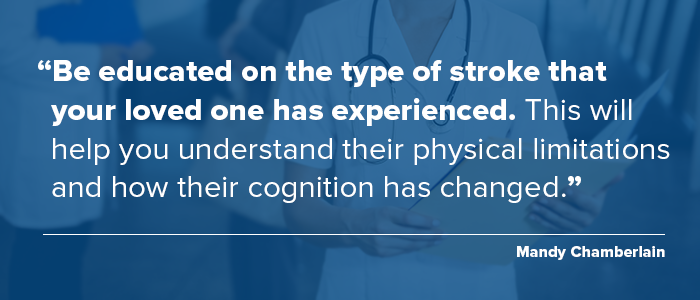
Chamberlain's caregiver tips-
Chamberlain recommends educating family and friends on the type of stroke that their loved one has experienced. “This will help them understand their physical limitations and how their cognition has changed,” she says, “With this information and the help of their OT/PT/SLP, they will be able to better understand what they need to do to help with the recovery process.” For example, with a better understanding of the stoke, you will be better prepared on how to help with a flaccid arm or how to handle verbal outbursts due to cognitive changes.
Additionally, Chamberlain wants to remind friends and family that stroke recovery is a very long process. “After a stroke, there is always a lot of support from the community, family and friends,” she says, “But as time goes on, that support dwindles.” However, support is needed at all stages of recovery for the survivor and the caregiver. That support could include “bringing meals to a caregiver who is tired and doesn't want to cook, providing respite care for a few hours so the caregiver can get their own TLC, or even socialization with the person who has had the stroke, as it can be a lonely and life changing event.”
Sally O'Connell, BHSc (Hons) OT MSc

O’Connell stresses patience and positivity in the moment, having daily routines that include setting aside time to care for yourself, and encouraging self-sufficiency, even very early in the recovery process.
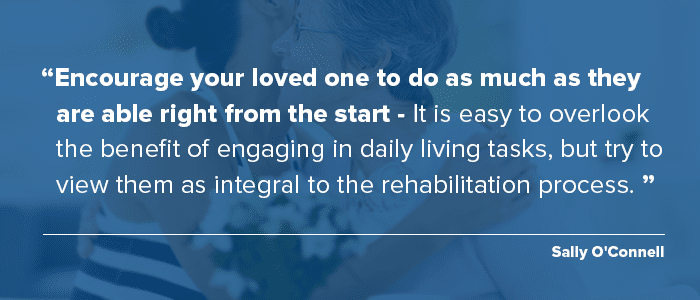
O’Connell's caregiver tips-
While caregivers spend so much time looking after their loved one, they tend to neglect taking care of themselves. O’Connell suggests making sure that you get enough sleep, eat healthily and try to exercise. “Plan in some time to engage in hobbies or activities that you enjoy,” she says, “This might be as simple as catching up with a friend for coffee or a more formal respite care arrangement.”
The road to recovery is long, so it’s important to pace yourself. O’Connell recommends focusing on one day at a time. “Be patient and positive,” she says, “It can sometimes be hard to see just how far you have both come, so keeping a diary of achievements, however small they may seem at the time, can be helpful.”
Keeping a daily routine is also good for both the caregiver and receiver. “Try to plan in regular rest periods for you both, and a regular time for completing any therapy programs that they may have been given,” O’Connell says. Integrating these times into your daily routine will help them become a natural part of your lives.
However, recovery work isn’t just reserved for specific therapy times. “Encourage your loved one to do as much as they are able right from the start,” O’Connell suggests, “It is easy to overlook the benefit of engaging in daily living tasks, but try to view them as integral to the rehabilitation process.”
For example, O’Connell says that standing to wash dishes at the sink addresses balance, strength, core stability, fine motor skills and dexterity, and cognitive skills such as memory and attention. “Encouraging self-sufficiency may be a gradual process of small steps at a time, but in the long run it will help your loved one re-learn skills and regain confidence and independence.”
Phyllis Liang, Occupational Therapist, PhD Candidate, B.OccThy (Hons)

(Photo Source- PBS)
Liang stresses self-care and listening to yourself among a growing list of responsibilities, along with enlisting the help of the people around you as well as professional services.
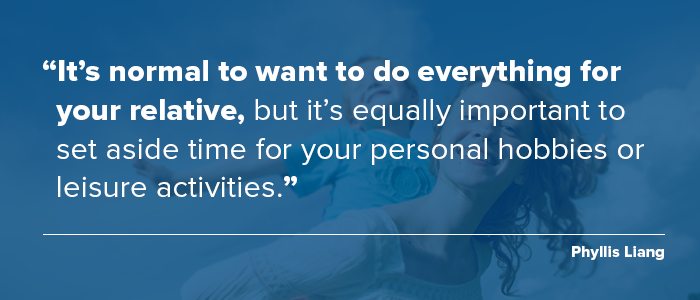
Liang's caregiver tips-
“Taking on a caregiver role usually means additional responsibilities and you may experience the practical and emotional burden of care,” Liang says, “It’s normal to want to do everything for your relative, but it’s equally important to set aside time for your personal hobbies or leisure activities.”
Taking care of yourself as a caregiver is crucially important, both for you and your loved one. Sometimes it’s easy to take on too much without asking for help, but it’s okay to share the caring responsibilities with others.“Some family members may feel guilty passing on the care to formal services such as respite care, or to friends and family around them. Others may also feel that they have to care for their relative because they are overwhelmed with thankfulness that their relative have survived the stroke,” says Liang.
It’s okay to ask for help. In fact, you probably should! “It is important that you do not bear all of these caring responsibilities on your own,” Liang says, “Start looking for some resources around you and ask your healthcare professional for some local services.”
As with any major transition, taking on the role of a caregiver for a stroke survivor is a challenge. Be sure to give yourself the time and space you need to examine the way you feel and respond to these changes from a good place. Ask for help and don’t forget to take care of yourself. There’s a wealth of resources and professionals that can help you make this transition easier.
Whether you are a caregiver, occupational therapist or a even a stroke survivor yourself, Saebo provides stroke survivors access to transformative and life changing products. We pride ourselves on providing affordable, easily accessible, and cutting-edge solutions to people suffering from impaired mobility and function. We have several products to help with the stroke recovery and rehabilitation process. From the SaeboFlex which allows clients to incorporate their hand functionally in therapy or at home, to the SaeboMAS, an unweighting device used to assist the arm during daily living tasks and exercise training, we are commitment to helping create innovative products for stroke recovery. Check out all of our product offerings or let us help you find which product is right for you.
All content provided on this blog is for informational purposes only and is not intended to be a substitute for professional medical advice, diagnosis, or treatment. Always seek the advice of your physician or other qualified health providers with any questions you may have regarding a medical condition. If you think you may have a medical emergency, call your doctor or 911 immediately. Reliance on any information provided by the Saebo website is solely at your own risk.

